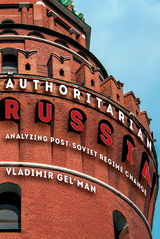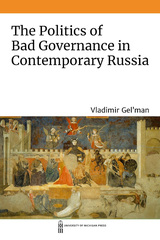2 books about Gel'man, Vladimir

Authoritarian Russia
Analyzing Post-Soviet Regime Changes
Vladimir Gel'man
University of Pittsburgh Press, 2015
Russia today represents one of the major examples of the phenomenon of “electoral authoritarianism” which is characterized by adopting the trappings of democratic institutions (such as elections, political parties, and a legislature) and enlisting the service of the country’s essentially authoritarian rulers. Why and how has the electoral authoritarian regime been consolidated in Russia? What are the mechanisms of its maintenance, and what is its likely future course? This book attempts to answer these basic questions.
Vladimir Gel’man examines regime change in Russia from the collapse of the Soviet Union in 1991 to the present day, systematically presenting theoretical and comparative perspectives of the factors that affected regime changes and the authoritarian drift of the country. After the fall of the Soviet Union, Russia’s national political elites aimed to achieve their goals by creating and enforcing of favorable “rules of the game” for themselves and maintaining informal winning coalitions of cliques around individual rulers. In the 1990s, these moves were only partially successful given the weakness of the Russian state and troubled post-socialist economy. In the 2000s, however, Vladimir Putin rescued the system thanks to the combination of economic growth and the revival of the state capacity he was able to implement by imposing a series of non-democratic reforms. In the 2010s, changing conditions in the country have presented new risks and challenges for the Putin regime that will play themselves out in the years to come.
Vladimir Gel’man examines regime change in Russia from the collapse of the Soviet Union in 1991 to the present day, systematically presenting theoretical and comparative perspectives of the factors that affected regime changes and the authoritarian drift of the country. After the fall of the Soviet Union, Russia’s national political elites aimed to achieve their goals by creating and enforcing of favorable “rules of the game” for themselves and maintaining informal winning coalitions of cliques around individual rulers. In the 1990s, these moves were only partially successful given the weakness of the Russian state and troubled post-socialist economy. In the 2000s, however, Vladimir Putin rescued the system thanks to the combination of economic growth and the revival of the state capacity he was able to implement by imposing a series of non-democratic reforms. In the 2010s, changing conditions in the country have presented new risks and challenges for the Putin regime that will play themselves out in the years to come.
[more]

The Politics of Bad Governance in Contemporary Russia
Vladimir Gel'man
University of Michigan Press, 2022
In this book, Vladimir Gel’man considers bad governance as a distinctive politico-economic order that is based on a set of formal and informal rules, norms, and practices quite different from those of good governance. Some countries are governed badly intentionally because the political leaders of these countries establish and maintain rules, norms, and practices that serve their own self-interests. Gel’man considers bad governance as a primarily agency-driven rather than structure-induced phenomenon. He addresses the issue of causes and mechanisms of bad governance in Russia and beyond from a different scholarly optics, which is based on a more general rationale of state-building, political regime dynamics, and policy-making. He argues that although these days, bad governance is almost universally perceived as an anomaly, at least in developed countries, in fact human history is largely a history of ineffective and corrupt governments, while the rule of law and decent state regulatory quality are relatively recent matters of modern history, when they emerged as side effects of state-building. Indeed, the picture is quite the opposite: bad governance is the norm, while good governance is an exception. The problem is that most rulers, especially if their time horizons are short and the external constraints on their behavior are not especially binding, tend to govern their domains in a predatory way because of the prevalence of short-term over long-term incentives. Contemporary Russia may be considered as a prime example of this phenomenon. Using an analysis of case studies of political and policy changes in Russia after the Soviet collapse, Gel’man discusses the logic of building and maintaining the politico-economic order of bad governance in Russia and paths of its possible transformation in a theoretical and comparative perspective.
[more]
READERS
Browse our collection.
PUBLISHERS
See BiblioVault's publisher services.
STUDENT SERVICES
Files for college accessibility offices.
UChicago Accessibility Resources
home | accessibility | search | about | contact us
BiblioVault ® 2001 - 2024
The University of Chicago Press









